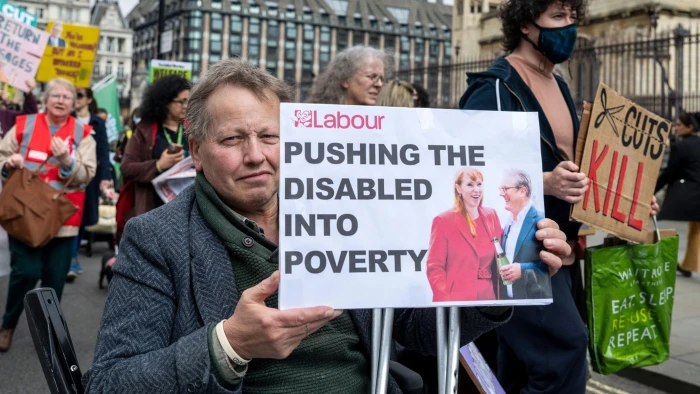By David Sheppard George Parker Jim Pickard
Around 150,000 people will be pushed into poverty by the end of this decade as a result of the Labour government’s planned welfare cuts, despite Sir Keir Starmer having made a partial U-turn over the measures.
The UK prime minister last week jettisoned key elements of the package of cuts to disability benefits to try to defuse a looming rebellion of Labour MPs.
Those original proposals would have pushed 250,000 people into poverty by 2030, according to modelling by the Department for Work and Pensions.
But the revised measures, on which MPs will vote on Tuesday, will still push 150,000 people into poverty, fresh government estimates published on Monday showed.
However, the modelling did not include any “potential positive impact” from extra funding and measures to support people with disabilities and long-term health conditions into work.
Liz Kendall, work and pensions secretary, will on Monday set out details of the government’s climbdown on welfare reform, which will cost £3bn to the exchequer.
Starmer’s key concession was that the more stringent rules for claiming personal independence payments (Pip) would only apply to new applicants and not those already receiving the benefit.
He also agreed to keep uprating the work-related component of the universal credit in line with inflation for existing claimants.
Talks are still ongoing between whips and Labour MPs, leaving the door open for potential concessions before Tuesday’s vote.
Asked if there would be further tweaks to the package, Downing Street said: “The government continues to engage closely with colleagues ahead of the vote.”
Kendall will give a statement to the House of Commons on Monday afternoon ahead of a key vote on the welfare bill on Tuesday, with dozens of Labour MPs still weighing up whether to oppose the legislation. The government will still lose if 83 Labour MPs vote against the measure, along with the opposition parties.
Ministers still expect to see the biggest rebellion of Starmer’s premiership, eclipsing the 16 who voted against the whips during the passage of the planning and infrastructure bill earlier this month.
Tony Blair’s biggest rebellion in his first year involved 47 backbenchers, according to Philip Cowley, politics professor at Queen Mary University.
Kendall’s statement comes alongside a written statement by Sir Stephen Timms, disabilities minister, setting out the terms of reference for a comprehensive review of Pip.
Baroness Jacqui Smith, skills minister, was on Monday sent out to defend the government’s watering down of its planned reforms.
“What I think is important is what we’re going to be starting tomorrow is [a] really important reform of a broken welfare system,” Smith told the BBC.
“Welfare reform is always difficult and I think actually the engagement that’s happened with Labour MPs, who are rightly bringing the concerns of their constituents about how this reform is going to work, have made this legislation better.”
Some MPs have welcomed Starmer’s concessions but critics say they risk creating a “two-tier” welfare system where people who become disabled after the reforms take effect could lose out.
Downing Street, questioned on whether a two-tier benefits system for new and existing claimants was legal, insisted that it was “entirely confident it will be legal”.
A spokesperson said: “It’s not unusual for systems to operate at different levels.”
The prime minister has argued the reforms are essential to stop the welfare budget rising ever higher, but the changes will reduce the savings for the government from almost £5bn to about £2bn-£2.5bn.
Combined with a previous U-turn on winter fuel payments for pensioners, chancellor Rachel Reeves has been left with a hole in her budget of close to £4bn.
The Treasury has said the hole will not be filled by “permanent” borrowing and will set out how it will be funded in the autumn Budget, prompting critics to warn Reeves will need to increase taxes.
Changing the actual text of the welfare bill at this stage is not possible, so MPs are being asked to take the ministerial statement as a promise that changes will be enacted later.
